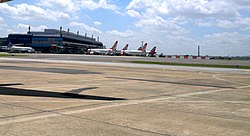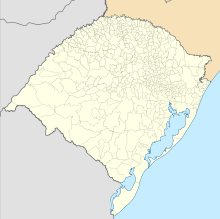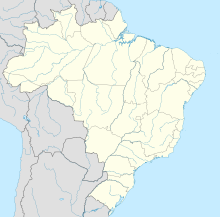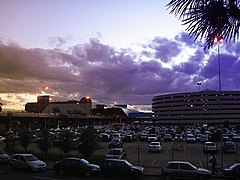Salgado Filho Porto Alegre International Airport
Porto Alegre–Salgado Filho International Airport Aeroporto Internacional de Porto Alegre–Salgado Filho | |||||||||||
|---|---|---|---|---|---|---|---|---|---|---|---|
 | |||||||||||
 | |||||||||||
| Summary | |||||||||||
| Airport type | Public | ||||||||||
| Operator |
| ||||||||||
| Serves | Porto Alegre | ||||||||||
| Focus city for | Azul Brazilian Airlines | ||||||||||
| Time zone | BRT (UTC−03:00) | ||||||||||
| Elevation AMSL | 9 m / 30 ft | ||||||||||
| Coordinates | 29°59′41″S 051°10′16″W / 29.99472°S 51.17111°W | ||||||||||
| Website | portoalegre-airport | ||||||||||
| Map | |||||||||||
 | |||||||||||
| Runways | |||||||||||
| |||||||||||
| Statistics (2023) | |||||||||||
| |||||||||||
Porto Alegre–Salgado Filho International Airport (IATA: POA, ICAO: SBPA) is the airport serving Porto Alegre and the region of Greater Porto Alegre, Brazil. Since October 12, 1951, it is named after the Senator and first Minister of the Brazilian Air Force Joaquim Pedro Salgado Filho (1888–1950).[5]
It is operated by Fraport Brasil.
History
[edit]Salgado Filho was originally called São João Federal Airport, after the neighborhood where it is located. In the beginning it was an air club, where the first flights landed on May 31, 1923.[citation needed]
In 1932, needing a facility for the fixed-gear aircraft which were replacing its seaplanes, Varig started using São João Airport as an operational base. However, it was only in 1940 that the first passenger terminal was commissioned.[6]
On October 12, 1951, São João Federal Airport was renamed Salgado Filho Airport, after the Senator and Minister who died the year before in a crash involving a SAVAG aircraft that departed from Porto Alegre.[5] On July 21, 1953, within a law prescribing rules for the naming of airports, the name of the facility was officially and exceptionally maintained as Salgado Filho Airport.[7]
In 1953, the old terminal was incorporated into the maintenance facilities of Varig, a new passenger terminal was opened, and runways were paved.[6] Until that year, larger aircraft such as Lockheed L-049 Constellations had to land at Canoas Air Force Base.[8] This new terminal is known today as Passenger Terminal 2. It underwent major renovations and enlargements between 1969 and 1971; but unable to cope with the increasing traffic, another brand new facility was built. This new facility was named Passenger Terminal 1 and opened on September 11, 2001.[citation needed] Terminal 2 became underused by general aviation and cargo services.
However, in order to cope with the increasing passenger traffic at the airport, on September 8, 2010, a decision was made to renovate Terminal 2 and bring it back into passenger use.[9] It became operational on December 4, 2010.[10] This terminal 2 was again closed for air traffic on September 15, 2019, and it became the administration center of Fraport Brasil S.A.- Aeroporto de Porto Alegre.[11]
Responding to critiques to the situation of its airports, on May 18, 2011, Infraero released a list evaluating some of its most important airports according to its saturation levels. According to the list, Porto Alegre was considered to be in good situation, operating with less than 70% of its capacity.[12]
Previously operated by Infraero, in January 2018, the airport's operations and administration were taken over by the German private airport operator Fraport, which in the previous year had been the winning bidder in an B3 (stock exchange) auction conducted by the Brazilian government for the concession of the airport for 25 years.[13][14] Since the airport concession, Fraport has been expanding the runway from the current 2,280 meters (7,481 ft) to 3,200 meters (10,499 ft), allowing the landing of large aircraft and allowing the landing of flights from North America and Europe. It is expected that the expansion works will be concluded at the end of 2021.[15]
The total area of the Salgado Filho Airport is about 3,805,810 square metres (40,965,400 sq ft) (940 acres) with 14,750 square metres (158,800 sq ft) of ramp area. Terminal 1 has 37,600 square metres (405,000 sq ft) and 16 gates with jetways. Terminal 2 has 15,540 square metres (167,300 sq ft). In front of Terminal 1 there is a carpark with 1,440 places. Terminal 1 is the first facility in Latin America with a shopping mall.
One of the two TAP Maintenance & Engineering centers in Brazil is located at Salgado Filho International Airport.
As of May 2022, the airport's expanded 3,200 m (10,499 ft) runway has come into operation. With the runway expansion, larger aircraft such as the Boeing 747-400, Boeing 777-300 and Airbus 330-900 can operate at the airport, allowing direct flights to Europe and the United States.[16]
Closure Due to Flooding
[edit]On May 3, 2024 due to catastrophic flooding affecting the State of Rio Grande do Sul and in particular to the flooding of the airport, all operations were suspended indefinitely.[17][18]
Operations to selected destinations resumed exceptionally at Canoas Air Force Base in the city of Canoas using a makeshift check-in facility at ParkShopping Canoas shopping mall. On July 15, 2024, all departure and arrival procedures restarted taking place at the Salgado Filho airport terminal, but with the passengers driven by bus directly to and from the Air Force Base apron.[19][20] On this same day, the makeshift check-in facility was closed.
The full airport resumption of services will be done in two phases: the first using a runway length of 1,730 m (5,676 ft) least affected by the flooding and restricted to 128 flights a day between 08:00 and 22:00. This first phase happened on October 21, 2024. The second phase, with full resumption of operations will take place on December 16, 2024.[21][22][23][24]
Airlines and destinations
[edit]Passenger
[edit]| Airlines | Destinations |
|---|---|
| Aerolíneas Argentinas | Buenos Aires–Aeroparque (resumes 2 March 2025)[25] |
| Azul Brazilian Airlines | Belo Horizonte–Confins, Campinas, Curitiba, Pelotas, Rio de Janeiro–Galeão, Santa Maria, Santo Ângelo, São Paulo–Congonhas, São Paulo–Guarulhos, Uruguaiana |
| Azul Conecta | Alegrete, Bagé, Canela, Santa Cruz do Sul, Santa Rosa (all suspended)[26] |
| Copa Airlines | Panama City–Tocumen |
| Gol Linhas Aéreas | Brasília, Rio de Janeiro–Galeão, São Paulo–Congonhas, São Paulo–Guarulhos |
| LATAM Brasil | Brasília, Curitiba, Rio de Janeiro–Galeão, São Paulo–Congonhas, São Paulo–Guarulhos |
| LATAM Chile | Santiago de Chile (resumes 3 January 2025)[27] |
| LATAM Perú | Lima (resumes 1 January 2025)[27] |
| TAP Air Portugal | Lisbon (resumes 1 April 2025)[28] |
Cargo
[edit]| Airlines | Destinations |
|---|---|
| Azul Brazilian Airlines | Campinas, São Paulo–Guarulhos |
| Total Linhas Aéreas | São Paulo-Guarulhos |
Statistics
[edit]

Following is the number of passenger, aircraft and cargo movements at the airport, according to Infraero (2007-2017) and Fraport Brazil (2018-2023) reports:[29][30][1]
| Year | Passenger | Aircraft | Cargo (t) |
|---|---|---|---|
| 2023 | 7,480,641 |
72,639 |
38,840 |
| 2022 | 6,600,103 |
66,402 |
26,709 |
| 2021 | 4,803,176 |
49,278 |
25,447 |
| 2020 | 3,476,011 |
37,913 |
19,645 |
| 2019 | 8,314,013 |
77,709 |
30,501 |
| 2018 | 8,292,608 |
80,990 |
36,973 |
| 2017 | 8,012,114 |
79,473 |
19,051 |
| 2016 | 7,648,743 |
79,738 |
18,159 |
| 2015 | 8,354,961 |
88,279 |
20,886 |
| 2014 | 8,447,380 |
92,960 |
21,152 |
| 2013 | 7,993,164 |
94,409 |
20,886 |
| 2012 | 8,261,355 |
96,693 |
22,394 |
| 2011 | 7,834,312 |
99,583 |
32,316 |
| 2010 | 6,676,216 |
90,625 |
26,970 |
| 2009 | 5,607,703 |
79,104 |
30,420 |
| 2008 | 4,931,464 |
72,445 |
31,601 |
| 2007 | 4,444,748 | 68,827 | 38,469 |
Accidents and incidents
[edit]- February 28, 1942: a Varig Junkers Ju 52/3m registration PP-VAL crashed shortly after take-off from Porto Alegre. Seven of the 23 occupants died, including 2 crew members.[31][32]
- June 20, 1944: a Varig Lockheed 10 A/E Electra registration PP-VAQ on approach to Porto Alegre after a flight from Pelotas during a storm crashed on the waters of Guaíba river. All 10 passengers and crew died.[33][34]
- August 2, 1949: a Varig Curtiss C-46AD-10-CU Commando registration PP-VBI operating a flight from São Paulo-Congonhas Airport to Porto Alegre made an emergency landing on rough terrain near the location of Jaquirana, approximately 20 minutes before landing in Porto Alegre, following fire on the cargo hold. Of the 36 passenger and crew aboard, 5 died.[35][36]
- June 30, 1950: a SAVAG Lockheed Model 18 Lodestar registration PP-SAA, flying from Porto Alegre to São Borja in bad weather collided against a hill, caught fire and crashed near the location of São Francisco de Assis. All 10 occupants died, including the founder of SAVAG and pilot, Gustavo Kraemer, and Joaquim Pedro Salgado Filho, senator and first Minister of Air Force in Brazil.[37][38]
- October 14, 1952: an Aerovias Brasil Douglas C-47-DL registration PP-AXJ operated by Real Transportes Aéreos en route from São Paulo-Congonhas to Porto Alegre struck high ground while flying under adverse conditions over the location of São Francisco de Paula. Of the 18 passengers and crew aboard, 14 died.[39][40]
- October 18, 1957: a Varig Douglas C-47A-80-DL registration PP-VCS operating a cargo flight from Porto Alegre crashed upon take-off. The crew of two died.[41]
- May 30, 1972: a Varig Lockheed L-188 Electra registration PP-VJL operating a flight between São Paulo-Congonhas to Porto Alegre was hijacked. The hijacker demanded money. The aircraft was stormed and the hijacker shot.[42]
- May 5, 2024: 47 aircraft were stuck at airport after the apron and runways were flooded during the 2024 Rio Grande do Sul floods. As the water level normalized, the aircraft were gradually flown away.[43][44][45]
Access
[edit]The airport is located 9 km (6 mi) from downtown Porto Alegre.
Since August 10, 2013, the Metro-Airport Connection people mover connects the International Airport to the Porto Alegre Metro Airport Station.[46] From this metro station one can reach most cities of the metropolitan area of Porto Alegre. Bus routes T5, T11, and B09 link Terminal 1 - International Airport to the city of Porto Alegre.
Gallery
[edit]-
Terminal 1 interior
-
LATAM Brasil, formerly TAM and GOL airliners
-
Check-in area
-
Terminal 1 seen from parking during sunset
See also
[edit]References
[edit]- ^ a b "Movimentação Aeroportuária". Porto Alegre Airport (in Portuguese). Retrieved 4 March 2024.
- ^ "Porto Alegre Airport". Fraport. Retrieved 5 May 2022.
- ^ "Aeródromos". ANAC (in Portuguese). 29 June 2020. Retrieved 19 April 2021.
- ^ "Salgado Filho (SBPA)". DECEA (in Portuguese). Retrieved 25 September 2023.
- ^ a b "Lei n˚ 1.457, de 12 de outubro de 1951". Presidência da República (in Portuguese). 12 October 1951. Retrieved 15 November 2023.
- ^ a b Beting, Gianfranco; Beting, Joelmir (2009). Varig: Eterna Pioneira (in Portuguese). Porto Alegre and São Paulo: EDIPUCRS and Beting Books. p. 35. ISBN 978-85-7430-901-9.
- ^ "Lei no 1.909, de 21 de julho de 1953". Presidência da República (in Portuguese). 21 July 1953. Retrieved 15 October 2023.
- ^ Germano da Silva, Carlos Ari César (2008). "Está faltando um". O rastro da bruxa: história da aviação comercial brasileira no século XX através dos seus acidentes 1928-1996 (in Portuguese) (2 ed.). Porto Alegre: EDIPUCRS. p. 96. ISBN 978-85-7430-760-2.
- ^ "Reformulação do antigo terminal do Aeroporto Salgado Filho é antecipada" (in Portuguese). Zero Hora. September 8, 2010. Archived from the original on July 22, 2012. Retrieved September 15, 2010.
- ^ Andrade, Artur Luiz (December 1, 2010). "Webjet utiliza terminal 2 do Salgado Filho (RS)" (in Portuguese). Panrotas. Archived from the original on July 6, 2011. Retrieved December 1, 2010.
- ^ "Porto Alegre Airport concentra operações de todas as companhias aéreas em um só Terminal" (PDF). Porto Alegre Airport (in Portuguese). 4 September 2019. Retrieved 17 September 2019.
- ^ "Governo muda critério de avaliação e 'melhora' desempenho de aeroportos" (in Portuguese). O Estado de S. Paulo. 19 May 2011. Archived from the original on 22 May 2011. Retrieved 20 May 2011.
- ^ "Aeroporto Internacional - Porto Alegre - RS" [International Airport - Porto Alegre - RS] (in Portuguese). Infraero. Archived from the original on 2018-03-23. Retrieved 2018-03-23.
- ^ "Fraport - Porto Alegre Airport". Fraport Porto Alegre. Archived from the original on 2018-03-23. Retrieved 2018-03-23.
- ^ "Prefeitura de Porto Alegre deve agilizar remoção de famílias da Vila Nazaré". Correio do Povo (in Brazilian Portuguese). Retrieved 21 April 2021.
- ^ Oliveira, Bruna (19 May 2022). "No aguardo das grandes aeronaves, expectativa é impulsionar exportações após ampliação da pista do aeroporto de Porto Alegre". GZH (in Brazilian Portuguese). Retrieved 20 May 2022.
- ^ "Aeroporto de Porto Alegre suspende todos os voos por tempo indeterminado". Aeroin (in Portuguese). 3 May 2024. Retrieved 6 May 2024.
- ^ "Aeroporto de Porto Alegre está tomado pela água e virou um grande lago". Aeroin (in Portuguese). 5 May 2024. Retrieved 8 May 2024.
- ^ "Veja como será o embarque no Salgado Filho para voos de Canoas". Panrotas (in Portuguese). 8 July 2024. Retrieved 8 July 2024.
- ^ "Terminal ParkShopping Canoas". Porto Alegre Airport (in Portuguese). Retrieved 4 June 2024.
- ^ "Ministro confirma para outubro a retomada parcial de pousos e decolagens no Salgado Filho". Gazeta do Povo (in Portuguese). 16 July 2024. Retrieved 29 August 2024.
- ^ "Ministro confirma para outubro a retomada parcial de pousos e decolagens no Salgado Filho". Gazeta do Povo (in Portuguese). 16 July 2024. Retrieved 30 July 2024.
- ^ "Fraport estipula data de retomada dos voos no Salgado Filho". Flap International (in Portuguese). 30 July 2024. Retrieved 30 July 2024.
- ^ "Retomada dos voos no Aeroporto de Porto Alegre se dará com 128 pousos e decolagens por dia". Aeroin (in Portuguese). 11 August 2024. Retrieved 23 August 2024.
- ^ "Aerolíneas Argentinas vai alocar passageiros de Porto Alegre em voos da Azul e Latam após cancelamentos". Aeroin (in Portuguese). 5 December 2024. Retrieved 5 December 2024.
- ^ "Aeroporto de Porto Alegre suspende todos os voos por tempo indeterminado". Aeroin (in Portuguese). 3 May 2024. Retrieved 5 June 2024.
- ^ a b "Latam anuncia retomada de voos de Porto Alegre para Lima e Santiago". Zero Hora (in Portuguese). 22 August 2024. Retrieved 23 August 2024.
- ^ "TAP já tem data para retomar os voos para Porto Alegre, e sem tirar o de Florianópolis". Aeroin (in Portuguese). 29 October 2024. Retrieved 29 October 2024.
- ^ "Anuário Estatístico Operacional" (PDF). Infraero (in Portuguese). 12 April 2012. Retrieved 4 March 2024.
- ^ "Estatísticas". Infraero (in Portuguese). Retrieved 4 March 2024.
- ^ Pereira, Aldo (1987). Breve História da Aviação Comercial Brasileira (in Portuguese). Rio de Janeiro: Europa. p. 75.
- ^ Germano da Silva, Carlos Ari César (2008). "Verão de 1942". O rastro da bruxa: história da aviação comercial brasileira no século XX através dos seus acidentes 1928-1996 (in Portuguese) (2 ed.). Porto Alegre: EDIPUCRS. pp. 42–48. ISBN 978-85-7430-760-2.
- ^ Pereira, Aldo (1987). Breve História da Aviação Comercial Brasileira (in Portuguese). Rio de Janeiro: Europa. p. 76.
- ^ Germano da Silva, Carlos Ari César (2008). "O Electra e o temporal". O rastro da bruxa: história da aviação comercial brasileira no século XX através dos seus acidentes 1928-1996 (in Portuguese) (2 ed.). Porto Alegre: EDIPUCRS. pp. 61–65. ISBN 978-85-7430-760-2.
- ^ "Accident description PP-VBI". Aviation Safety Network. Archived from the original on November 4, 2012. Retrieved August 15, 2011.
- ^ Germano da Silva, Carlos Ari César (2008). "Fogo a bordo". O rastro da bruxa: história da aviação comercial brasileira no século XX através dos seus acidentes 1928-1996 (in Portuguese) (2 ed.). Porto Alegre: EDIPUCRS. pp. 83–86. ISBN 978-85-7430-760-2.
- ^ "Accident description PP-SAA". Aviation Safety Network. Archived from the original on January 28, 2012. Retrieved August 15, 2011.
- ^ Germano da Silva, Carlos Ari César (2008). "Salgado Filho". O rastro da bruxa: história da aviação comercial brasileira no século XX através dos seus acidentes 1928-1996 (in Portuguese) (2 ed.). Porto Alegre: EDIPUCRS. pp. 102–107. ISBN 978-85-7430-760-2.
- ^ "Accident description PP-AXJ". Aviation Safety Network. Archived from the original on November 4, 2012. Retrieved August 16, 2011.
- ^ Germano da Silva, Carlos Ari César (2008). "Erro de navegação". O rastro da bruxa: história da aviação comercial brasileira no século XX através dos seus acidentes 1928-1996 (in Portuguese) (2 ed.). Porto Alegre: EDIPUCRJ. pp. 112–117. ISBN 978-85-7430-760-2.
- ^ "Accident description PP-VCS". Aviation Safety Network. Archived from the original on November 4, 2012. Retrieved August 16, 2011.
- ^ "Incident description PP-VJL". Aviation Safety Network. Archived from the original on November 4, 2012. Retrieved August 16, 2011.
- ^ "Incident description of several aircraft". Aviation Safety Network. Retrieved 23 June 2024.
- ^ https://en.aeroflap.com.br/dc-3-da-varig-in-porto-alegre-once-again-receives-visits-on-board-for-free/amp/ [bare URL]
- ^ https://www.reuters.com/pictures/stunning-aerial-photos-show-devastating-scale-flooding-brazil-2024-05-19/ [bare URL]
- ^ "G1 - Com a presença de Dilma, aeromóvel é inaugurado em Porto Alegre - notícias em Rio Grande do Sul". Rio Grande do Sul. 10 August 2013. Archived from the original on 2013-08-13. Retrieved 2013-08-18.
![]() This article incorporates public domain material from the Air Force Historical Research Agency
This article incorporates public domain material from the Air Force Historical Research Agency
External links
[edit]![]() Media related to Salgado Filho International Airport at Wikimedia Commons
Media related to Salgado Filho International Airport at Wikimedia Commons
- Airport information for SBPA at Great Circle Mapper. Source: DAFIF (effective October 2006).
- Current weather for SBPA at NOAA/NWS
- Accident history for POA at Aviation Safety Network







